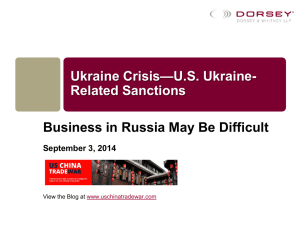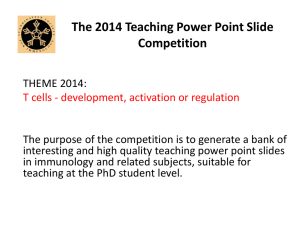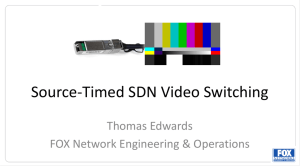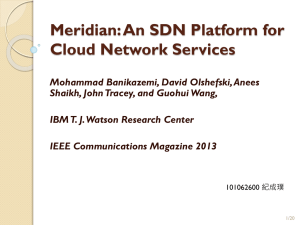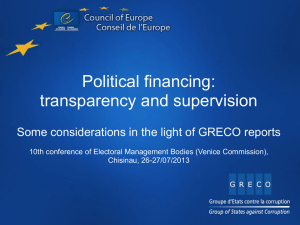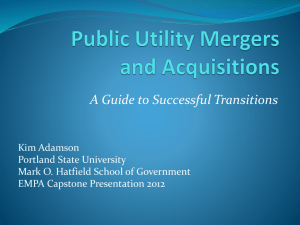An Overview of the Current U.S. Sanctions Regime with respect to
advertisement
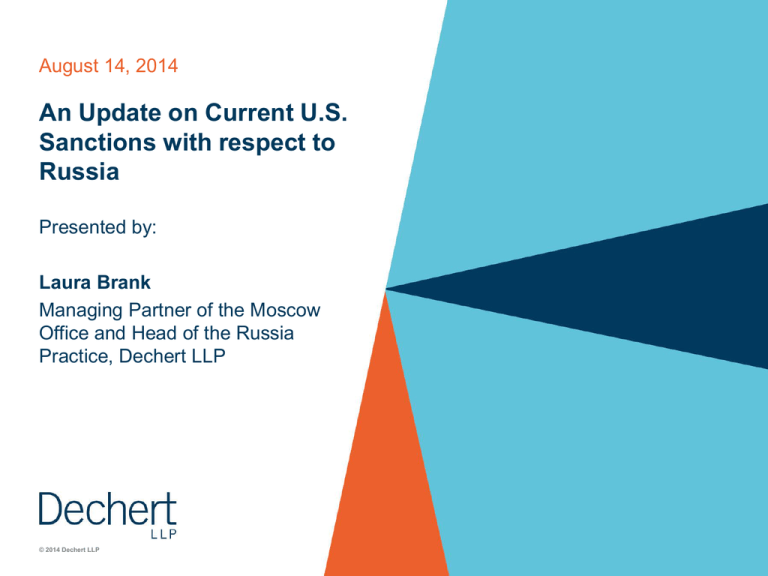
August 14, 2014 An Update on Current U.S. Sanctions with respect to Russia Presented by: Laura Brank Managing Partner of the Moscow Office and Head of the Russia Practice, Dechert LLP © 2014 Dechert LLP Disclaimer This presentation is designed to provide general information on a developing situation and should not be treated as a substitute for legal advice. If legal advice is required, the services of a qualified lawyer should be sought. 2 Table of Contents Contents 1. What has Changed? 2. Brief Overview of the SDN List 3. Brief Overview of the SSI List 4. Transacting with Entities on the SSI List 5. Case Studies 6. List of Current SSI-Designated Entities (from July 16, 2014) 7. List of SDN-Designated Individuals and Entities (from July 16, 2014) U.S. Sanctions What Has Changed? As the crisis in Ukraine has escalated, U.S. sanctions with respect to Russia have evolved to target prominent companies in key sectors, specifically those operating in the financial services and energy sectors. ▸ On July 16, 2014, the U.S. Government imposed additional sanctions against Russian and Ukrainian individuals and companies as a result of the ongoing crisis in Eastern Ukraine. ▸ The companies designated on the SSI List by the July 16 sanctions are: Gazprombank, State Corporation VneshEconomBank (a.k.a VEB), OAO Novatek, and Rosneft. ▸ In addition to adding five individuals and eleven ▸ On July 29, the U.S. Government added Bank entities to the List of Specially Designated Nationals and Blocked Persons (the “SDN List”), the U.S. Government also imposed more targeted sanctions against four major Russian financial and energy companies, adding these companies to the newly-created Sectoral Sanctions Identification List (the “SSI List”). of Moscow, Russian Agricultural Bank (Rosselkhozbank), and VTB Bank OAO to the SSI List, and United Shipbuilding Corporation to the SDN List. ▸ The restrictions imposed on the parties listed on the SSI List are significantly different from (as well as significantly less restrictive than) those imposed on the individuals/entities listed on the SDN List. 4 U.S. Sanctions Brief Overview of the SDN List Until July 16, 2014, the SDN List was the main tool by which the U.S. Government targeted Russian parties. ▸ The first executive order issued by President Barack Obama (E.O. 13660 – March 6, 2014) provided the framework for sanctions against targeted individuals, setting forth the scope as follows: • “All property and interests that are in the United States, that hereafter come within the United States, or that are or hereafter come within the possession or control of any United States person (including any foreign branch) of the following persons are blocked and may not be transferred, paid, exported, withdrawn, or otherwise dealt in...” ▸ E.O. 13660 gives the Secretary of the Treasury, in consultation with the Secretary of the State, the responsibility of determining the persons to be targeted by the restrictions (according to a list of qualifying factors, which E.O. 13661 expands). ▸ The Office of Foreign Assets Control (OFAC) of the U.S. Department of the Treasury administers and enforces economic and trade sanctions, and acts under Presidential national emergency powers, as well as authority granted by specific legislation, to impose controls on transactions and freeze assets under U.S. jurisdiction. OFAC maintains the SDN List. ▸ U.S. persons are generally prohibited from dealing with individuals and entities designated on the SDN List (wherever they are located), as well as with their assets. 5 U.S. Sanctions Brief Overview of the SDN List ▸ Generally, SDN-type sanctions, as prescribed initially by E.O. 13660 require the “blocking” of all property and interests in property of any person on the SDN List, and prohibit: ▸ engaging in financial transactions with, or for the benefit of a person on the SDN List ▸ transferring money or any property to such persons ▸ dealing in property in which such persons have an interest ▸ exporting goods or services to, or importing goods or services from, or for the benefit of, a person on the SDN List ▸ According to OFAC, “blocked” (or “frozen”) property remains with the target but the exercise of powers and privileges normally associated with ownership is prohibited without authorization from OFAC. Blocking immediately imposes an across-the-board prohibition against transfers or dealings of any kind with regard to the property. ▸ Entities that a person on the SDN List owns (which is defined as direct or indirect ownership interest of 50% or more) are also blocked, even if that entity isn’t explicitly named on the SDN List. ▸ Funds, for example, are required to block all property and interests in property of a person on the SDN List (and persons in which an SDN has a 50% or greater interest). Funds may also be required to block securities issued by a company subject to sanctions, even if acquired and traded on the secondary market, and are required to report blocked property to OFAC. 6 U.S. Sanctions Brief Overview of the SSI List The newly-created SSI List was introduced as part of the July 16 round of U.S. sanctions on Russia. ▸ Executive Order (E.O.) 13662 of March 20 expanded the scope of U.S. sanctions to also target any person, determined by the Secretary of the Treasury, in consultation with the Secretary of State: ▸ “to operate in such sectors of the Russian Federation economy as may be determined by the Secretary of the Treasury, in consultation with the Secretary of State, such as financial services, energy, metals and mining, engineering, and defense and related materiel…” ▸ The designations to the SSI List on July 16 (and then subsequently on July 29) were made pursuant to Directive 1 of E.O. 13662, which sets out the restrictions on entities deemed to be a part of the financial services sector of the Russian Federation economy, and Directive 2 of E.O. 13662, which sets out the restrictions on entities deemed to be a part of the energy sector of the Russian Federation. ▸ SSI prohibitions also extend to any entity that is owned 50% or more by any entities on the SSI List. ▸ According to OFAC, which also maintains the SSI List, the actions pursuant to Directives 1 and 2 prohibit transactions by U.S. persons as defined in E.O. 13662 wherever they are located, as well as transactions within the United States. Designation of these entities on the SSI List is not a blocking action, nor will persons identified in Directives 1 and 2 necessarily be added to the Specially Designated National (SDN) List, and the action (designation) does not require U.S. persons to block the property or interests in property of the designated entities. 7 U.S. Sanctions Brief Overview of the SSI List Directive 1 – Financial Services Sector Directive 2 – Energy Sector The following transactions by U.S. persons or within the United States are hereby prohibited: transacting in, providing financing for, or otherwise dealing in new debt of longer than 90 days maturity or new equity for these persons, their property, or their interests in property. All other transactions with these persons or involving any property in which one or more of these persons has an interest are permitted, provided such transactions do not otherwise involve property or interests in property of a person blocked pursuant to Executive Orders 13660, 13661, or 13662, or any other sanctions programs implemented by the Office of Foreign Assets Control. The following transactions by U.S. persons or within the United States are hereby prohibited: transacting in, providing financing for, or otherwise dealing in new debt of longer than 90 days maturity for these persons, their property, or their interests in property. All other transactions with these persons or involving any property in which one or more of these persons has an interest are permitted, provided such transactions do not otherwise involve property or interests in property of a person blocked pursuant to Executive Orders 13660, 13661, or 13662, or any other sanctions programs implemented by the Office of Foreign Assets Control. Source: U.S. Treasury website 8 U.S. Sanctions Brief Overview of the SSI List ▸ Key definitions: • New Debt: includes bonds, loans, extensions of credit, loan guarantees, letters of credit, drafts, banks acceptances, discount notes or bills, or commercial paper with a maturity of more than 90 days issued on or after July 16, 2014. • New Equity: includes stocks, share issuances, depositary receipts, or any other evidence of title ownership issued on or after July 16, 2014. ▸ U.S. persons are prohibited from transacting in, financing, or otherwise dealing in any New Debt AND New Equity issued by, on behalf of, or for the benefit of GazpromBank OAO and VEB (July 16); and Bank of Moscow, VTB Bank OAO and Russian Agricultural Bank (July 29). ▸ Directive 2 (energy sector) differs from Directive 1 (financial services sector) in that there are no restrictions on U.S. persons transacting in, financing, or otherwise dealing in any New Equity issued by the entities deemed to be persons operating in the Russian energy sector. In this case, U.S. persons are permitted to engage in any transactions involving any equity (including new equity) of OAO Novatek and OAO Rosneft, which are the only two entities to which Directive 2 applies at present. 9 U.S. Sanctions Transacting with Entities on the SSI List The restrictions imposed on the entities on the SSI List are far lighter, and vary greatly, from those imposed on entities listed on the SDN List. ▸ For entities deemed as operating in the financial services sector of the Russian Federation, U.S. persons are still permitted to engage in any transactions involving any equity or debt issued prior to July 16, 2014 (or with a maturity of less than or equal to 90 days), and all other transactions involving the designated entities. ▸ For entities deemed as operating in the energy sector of the Russian Federation, U.S. persons also engage in any transactions involving any equity of these entities. ▸ OFAC has issued a new General License permitting U.S. persons to engage in all transactions involving derivative products whose value is linked to underlying New Debt or New Equity subject to sanctions. U.S. financial institutions also are permitted to maintain correspondent accounts and process U.S. dollar-clearing transactions for the Russian entities identified on the SSI List, so long as those activities do not involve the types of prohibited property discussed above. ▸ The SSI-type sanctions are designed to limit the designated entities’ access to U.S. capital markets, whereas the SDN-type sanctions are aimed at restricting any U.S. business with its targets. 10 U.S. Sanctions Sample Case Studies Case Study 1 – SDN Example 1 Case Study 2 – SDN Example 2 • Bank of America NA fined $16.5 million on July 24, 2014 for conducting SDN-related transactions • Between 2005 and 2009, Bank of America NA processed 208 transactions totaling approximately $90,000 on behalf of 10 individuals on the SDN List • Bank of America also failed to block the SDNheld accounts as required under US sanctions laws • OFAC considered many of the violations to be egregious – leading to a higher penalty – as many of the transactions occurred after Bank of America became aware of, and failed to fix, a significant deficiency in their internal screening tools intended to detect SDN-held accounts • Non-U.S. subsidiary of US parent company entered into a contract in 2012 to provide items and services to United Shipbuilding Corporation • USC was added to the SDN List on July 29, 2014 • Non-U.S. subsidiaries that act independent of their U.S. parents are not directly subject to US sanctions restrictions regarding SDNs, so subsidiary can continue to perform on contract • However, no U.S. citizens or legal permanent residents – even if located outside of the US and employed by the non-U.S. subsidiary – can be involved or facilitate activities with USC • U.S. parent company also cannot be involved in any way in the activities • U.S. suppliers must refuse to provide items in support of the project, if they know such items are destined for retransfer to USC 11 U.S. Sanctions Sample Case Studies Case Study 1 – SSI Example 1 Can a U.S. asset manager/mutual fund buy/sell/hold publicly-traded securities of an SSI listed entity? • What SSI-related prohibitions apply to the entity? Prohibitions just on new debt (energy SSI entities), or on both new debt and new equity (financial SSI entities)? • If prohibitions extend to new equity of the SSI entity, then must assess when the securities were issued • If issued prior to date on which the entity was added to the list, then no prohibitions on any transactions involving that debt • But for securities issued after the date of addition to the SSI list, this constitutes “new equity” and U.S. persons cannot deal in such securities Case Study 2 – SSI Example 2 Can a U.S. company sell products to a company on the SSI List? • US persons are prohibited from dealing in "new equity" and/or "new debt" with a maturity of 90 days of SSI entities. Other interactions with SSI entities remain permitted. • Sales of commercial items to SSI entities generally are permitted • Main potential complication is if the sale involves extended payment terms - US Government takes the view that giving credit terms of more than 90 days is equivalent to transacting in the issuance of a "new debt" with a maturity of more than 90 days. Therefore would be prohibited if: • The customer is an SSI entity, and • The sale agreement with extended payment terms is entered into after the effective date of the sanctions. 12 List of Current SSI-Designated Entities (from July 16, 2014) Financial Services Sector Gazprombank OAO: Russia’s third largest bank by assets. Gazprombank provides services to more than 45,000 companies and 3 million private individuals, and has more than 40 branches across Russia and a number of international subsidiaries. VneshEconomBank (VEB): a Russian stateowned financial institution that acts as a development bank and payment agent for the Russian government. Bank of Moscow: a Russian state-owned financial institution (through its parent bank, VTB Bank OAO) with 148 sub-offices located in all administrative districts of Moscow. Russian Agricultural Bank (aka Rosselkhozbank): a state-owned bank, which acts as a Russian government agent offering a full range of financial services to its clients. It has a network of 78 regional branches and 1,500 additional offices covering Russia. VTB Bank OAO: a state-owned bank, and, together with its subsidiaries (the “VTB Group”), is Russia’s second-largest banking group. The VTB Group has more than 1,600 offices in Russia, and operates more than 30 banks in 23 countries across Europe, Asia, and Africa. VTB Bank’s shares are traded on the Moscow Exchange and on the London Stock Exchange. Energy Sector OAO Novatek: Russia’s largest independent natural gas producer. Rosneft: Russia’s largest petroleum company and third largest gas producer. The U.S. Department of the Treasury designated Igor Sechin, Rosneft’s President and Chairman of the Board, on April 28, 2014 (SDN List). 13 List of SDN-Designated Individuals and Entities (from July 16, 2014) Individuals ▸ Beseda, Sergey ▸ Borodai, Aleksandr ▸ Neverov, Sergei ▸ Joint Stock Company Concern RadioElectronic Technologies (a.k.a. “KRET”) ▸ Joint Stock Company Concern Sozvezdie ▸ Joint Stock Company Military-Industrial Corporation NPO Mashinostroyenia ▸ Savelyev, Oleg ▸ Joint-Stock Company Concern Almaz-Antey ▸ Shchegolev, Igor ▸ Kalashnikov Concern Entities ▸ Konstruktorskoe Byuro Priborostroeniya ▸ Donetsk People’s Republic ▸ Federal State Unitary Enterprise Research and Production Enterprise Bazalt (NPO Bazalt OAO) Otkrytoe Aktsionernoe Obschestvo ▸ Luhansk People’s Republic ▸ United Shipbuilding Corporation ▸ Uralvagonzavod ▸ Feodosia 14 Questions? Laura Brank Managing Partner of the Moscow Office and Head of the Russia Practice, Dechert LLP laura.brank@dechert.com For further information, visit our website at dechert.com. Dechert practices as a limited liability partnership or limited liability company other than in Almaty, Dublin, Hong Kong, Luxembourg and Tbilisi.
